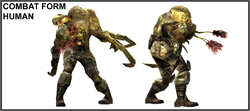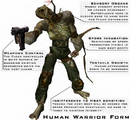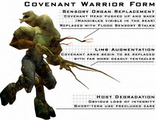Flood combat form
From Halopedia, the Halo wiki
Template:Ratings Template:Flood Species Infobox A Flood Combat Form is a vertebrate suitable for combat that has been infected with the Flood parasite via an Infection Form and mutated into a combat unit that fights for Flood goals and objectives.
Pathology
300px A Combat Form (Inferi redivivus) is not a natural organism, but rather a mutated host infected by parasitic Flood Super Cells implanted by an Infection Form. Successful creation of a Combat Form requires a host with sufficient biomass and calcium store. After mutation begins, the infection form attaches with a protruding neural connection that allows it to command the host's nervous system. During the infection process, the host's internal organs are liquefied and the nutrients from them are used to develop the tentacles and other appendages. The host stays alive during the transformation process and is even conscious and aware after the final transformationTemplate:Fact. This process is presumably painful and terrifying. Once fully transformed, the Infection Form has total control over the host's body and changes the physical appearance of the host to better suit its own needs. (Although an infected host will be roughly the same size as it was before.) On rare occasions, this effect may be weakened by time in stasis, allowing the host to regain some control [1]. Combat Forms retain the host's previous skills and so can wield weapons, drive vehicles and board enemy vehicles. However, Infection Forms do not require their hosts to still be alive for infection. Even dead hosts are suitable for conversion into a Combat Form, reanimating again after being infected. Though the brain tissue remains dead, the victim's biomass and calcium reserves are sufficient to warrant infection. In the initial stage of a Flood outbreak, the Feral Stage, Combat Forms communicate using pheromones and have one instinctual behavior: to secure new hosts to strengthen the local controlling intelligence. Once a sufficient store of biomass is available for the Flood to enter the Coordinated Stage and begin forming Pure Form Flood, the Combat Forms are used either as defensive units or calcium/biomass reserves. Eventually, a healthy Combat Form will mutate into a Carrier Form or Pure Form to perpetuate the Flood species. The Combat Form will prematurely transform if it takes so much damage that it cannot function effectively. Flood infection is a rapid and efficient biological process, which can take under a minute in extreme cases. An interesting side effect of the deadly human disease Boren's Syndrome, which Sergeant Avery Johnson suffered from, is total immunity to Flood super cells. The Flood can recognize if a potential host is immune, and will focus on that organism above other threats in the area. A group of Flood will occasionally go after Sentinels if they are perceived the greatest threat in the area, although Sentinels are unable to be infected with the Flood virus. [2]
Types of Combat Forms
When infection takes place, not just any creature will do for creation of Combat Forms by the Flood. Of the various Covenant races, only a few species meet the necessary requirements. Species known to be immune to conversion include the Hunter, whose segmented neural structure make synchronization impossible for Infection Forms, the Jackals whose avian bodies lack sufficient calcium stores, Grunts, for the same reason as Jackals, the Drones whose chitinous shell makes infection impossible, and the Engineer, which is artificial and therefore immune. Grunts and Jackals are instead used as biomass for creating Carrier Forms Presumably, infinite possible host species exist. However, only three are seen in gameplay.

Human Form
The Human Combat Form is significantly smaller than other forms. As with other Combat Forms, it is capable of sustaining massive physical damage before being unusable to the Flood controller; in fact, as long as the chest cavity and legs remain intact, it will continue to fight. Although it cannot take as much damage as the Elite Combat Form can, it has some advantages. It seems to be more alert, and is quicker to melee an opponent. It also presents a smaller, harder to hit target, especially the Infection Form, as it isn't protruding out of the body as much as those of Elite Forms. They wield the weapons of former UNSC Marines and, if available, those of the Covenant. They can be dangerous when wielding UNSC weapons like the Shotgun,which on higher difficulties can kill you in a couple of shots. In Halo 2, they are also capable of driving vehicles such as Warthogs, Scorpion Tanks, and Ghosts. While they lose the ability to drive vehicles in Halo 3, slow moving ones can still be boarded. They can wield any weapon, including Gravity Hammers and Brute Shots. But like the Brute Combat Form, they only use their tentacle arm to attack -- they never use the hammer.

Elite Form
During infection, the Elite's head is forced backwards to create space for the infection form to reside. This Combat Form is a formidable enemy and is capable of deadly physical attacks using whip-like tentacles. It can also wield both Human and Covenant weapons. It is very fast, very strong, and can jump great distances and heights like most flood. Some Elite combat forms can still use their armor's Active Camouflage and Energy Shields. Fortunately for the player, because of Elite physiology, they are bigger than the human form and present a larger target to shoot at. All of the elite combat forms encountered are minors but one infecting a higher rank elite can become one of that rank. They can use any vehicle in Halo 2, but like the others, they can't use any in Halo 3, but they still can board a slow moving one and hit a devastating blow. If equipped with a hammer it will use its tentacles and not the hammer blow.
Brute Form
Brute Combat Forms behave much more aggressively in combat towards an opponent. It charges at an opponent much more than normal Brutes. During infection, the Infection Form burrows into their skulls and force the jaws apart to create a residual space. The creature seems to draw on its host's brutish nature and often forgo projectile weapons in favor of close combat. They usually wield Brute weapons such as Spikers, Maulers, Brute Shots, and even Gravity Hammers, as well as more traditional Covenant weaponry and human armaments. However, they do not use the hammer to great effect, they just use it to melee instead of using the primary explosive hit (though that may have been a consideration on Bungie's part). They are more powerful than the Human Form, but they are slower (bulkier) and can't jump as high. Since when a brute's armor is damaged far enough, it falls off leaving a stripped body. When a Flood infection form infects them, they don't have shielding capabilities like the Elite form. A shotgun round or a few melee attacks should finish them off.
Anti-Flood Countermeasures
Combat Forms can take extensive and sizable amount damage before being neutralized. Arms, legs, even heads can be totally blown off and before they are incapacitated. The weak areas of a Combat Form are its sensory appendages that normally develop on the upper chest. This is where the Infection Form has nestled, and the body is incapacitated if this area is destroyed by a projectile weapon. In all three Halo games, a Combat Form may fall only to stand up again and keep fighting. This can only happen if it still has a usable limb and appendage. In Halo 2 and 3, if the body is not destroyed, such as by an Energy Sword, Grenade or Brute Shot blade, Combat Forms can be revived by other Infection Forms crawling into it. Human weapons are generally more effective against the Flood. Covenant plasma weaponry is designed to debilitate by causing burning pain and structural damage to bodies, but the Flood cannot feel pain or be crippled. Piercing weapons such as the Sniper Rifle have little effect on combat forms. However, they can be killed with sufficient force from projectile and melee weapons. Explosives such as grenades, rocket launchers, and the Brute Shot can easily kill a combat form. Plasma or Spike grenades should be used with caution, as the Combat Form will sometimes ignore all other targets and charge players using those weapons at high speed. The Needler can be devastating, as the seven-needle explosion will prevent it coming back to life in Halo: Combat Evolved, and will shatter it in Halo 2 and 3. At close range the Shotgun, Mauler, Brute Spiker, Brute Shot (melee only), and Energy Sword are the best weapons. At close to medium ranges the M6C Magnum and SMG are fairly effective against Combat Forms due to their fast fire rate, as well as the Sentinel Beam due to its continuous fire and burning capabilities. At long range the BR55 Battle Rifle, Covenant Carbine, or the M6D can be used to fire two shots to the upper chest. Burning Flood forms is one of the most effective methods in any situation, as is destruction of the torso. In Halo 2, the Sentinel Beams dropped by the Forerunner Sentinels are also very effective against the flood. In Halo 3, plasma and melee attacks, formerly weak against the Flood Combat Forms, are now highly effective: a Combat Form can usually be destroyed with 1-3 melee attacks depending on its type and the difficulty setting, and weapons such as the Plasma Rifle are very effective, especially when dual-wielded. Also, a melee attack with any weapon to a Combat Form corpse render it unusable to Infection forms.
Harmless Combat Forms
In Halo: Combat Evolved it's possible to remove both arms off a Combat Form, rendering it harmless and even helpful. These forms will follow the player and "nestle" close to it in an attempt to attack. It is only necessary to remove the un-tentacled arm of the Combat Form if it is unarmed. If it has a weapon, both limbs must be removed. These forms can be used as effective shields and will often charge Covenant enemies as a distraction. This bug was removed in Halo 2. Instead, removing both arms will cause the Infection Form to abandon the damaged host in search of another. It is still possible to remove one arm if the Combat Form is not carrying a weapon. In Halo 3 removing the tentacled limb of an unarmed Combat Form causes it to melee the player. But, in some rare cases, in Halo 3 if they pick up a Gravity Hammer and have their tentacle arm shot off, they will act similar to the "Flood Buddies", approaching the player for a few seconds then walking away then repeating and, in some cases, attacking the player with invisible arms. Occasionally, if a Flood is not completely destroyed (i.e. all limbs removed, splattered, head removed), it will eventually get back up and keep fighting. If you kill the Flood but not the dead host (if the Flood leaves its host) it will become an open host for a new Flood to occupy.
Trivia
- A Brute combat form jaw is pushed below the infection's opening.
- In Halo: Combat Evolved during the final level, Human Combat Forms can be found in the armory that are cloaked. (This is puzzling as humans do not posses this technology.)
- In Halo: Combat Evolved Combat Forms will not disintegrate from successive melee hits when they are dead like in Halo 2 and Halo 3.
- Elites will have the same armor color after infected, seven armor colors are seen, Minors (standard)-Light Blue, Minors (Alt)-Dark Blue SpecOps (Standard)-Purple, Specops (Alt)- teal-black, Majors (standard)-Red, Majors (Alt)-Orangeish/copper and Ultras-White.
- Halo 2 is the only game where the Flood use vehicles.
- If the IWHBYD skull is activated in Halo 3, the background murmuring of the combat forms sounds like brains. Also, if you try hiding in a corner, it may sound like "I see you..."
- Flood Juggernaut, Flood Combat, and Tank Forms have a "mouth like" head, where the sensory tentacles are located. Shooting this area counts as a headshot.
- In all of the Halo games, Flood Combat Forms always hold the Shotgun with one hand, and fire it without pumping another round into the chamber. In Halo 1, they somehow manage to make the shotgun pump itself.
- Sometimes in Halo 3 Flood will wield flamethrowers if they are revived close to one.
- Sometimes in Halo 3 Flood combat forms can be seen wielding Plasma turrets with one arm or tentacle. This is common on the level The Covenant, right after you kill the Brute Chieftain with the Plasma Cannon.
- In Halo 2 and Halo 3, Flood Combat Forms retain more of the host's armor, such as chest plating. They were almost naked in Halo: Combat Evolved. This could be attributed to the Flood becoming more intelligent, due to the Gravemind's influence.
- In Halo 2, all the Flood infected Elites wear the armor of an Elite Minor, even on levels where no Minor Elites were found. In Halo 3, an infected Elite Ultra retains the appropriate armor of an Ultra, but reverts to that of a Minor when it is killed. In Halo 3, an infected Chieftain will turn into a Brute combat form with Minor Brute Armor on. These errors were due to memory constraints and also represent the rapid increase of visual effects technology over the course of the development of the games.
- Occasionally, if a player throws a Plasma Grenade on a Combat Form it will charge towards the player, ignoring any other non-Flood targets. In Halo 3 they will jump away from grenades.
- During some parts of the Halo 2 levels with Combat Forms some are seen rarely using sniper rifles, although their poor aim suggests that the forms feeler-based sensory would make using scope-based weapons pointless (when they use the M6D pistol in Combat Evolved they always aim for the chest). On Legendary difficulty, however, these Combat Forms are incredibly deadly as they can one-shot-kill the player with great accuracy.
- Flood Combat Forms in Halo 3 can pick up weapons discarded by the player, i.e. Spartan Lasers, if there is any ammo/charge left in the weapon. Care should be taken when dropping these kinds of powerful weapons around Flood forms, as they might be used against you by revived Flood.
- If a Brute Chieftain with a Gravity Hammer is infected, the hammer will most likely be "dissolved" into the Combat Form, making it disappear completely.
- A Combat Form's old "head" (the one that used to belong to the host) will move or twitch as if in pain if you watch it in the theater in Halo 3.
- In Halo 3, if an Elite is infected, a Gravity Hammer like pulse will be emitted from his suit. It is unknown why this happens, though it could be a remnant of an energy shield.
- In Halo 2 if you look at the flood infected Elites mouth the mandible guards are white like an Ultras.
- In Halo 3, the gold skull "fog" is held by a Flood combat form.
- Halo 3 is the only game where you can instantly kill a combat form by meleeing them.
- In the Halo: CE level, The Maw, 2-3 Flood forms will attack with their hosts' Active Camouflage still activated attack you in the armory, and if you kill them and they get back up, their Active Camo won't work.
- Combat forms can hold two-handed weapons ( brute shot,shotgun,etc.) with one hand.
- In Halo 3 if you shoot a Combat Form's "host face" it will "pop" and be covered in blood.
- In Halo 3 if you shoot off a Flood Combat Form's arms it will try to push you off a cliff by running into you.
- In Halo: Combat Evolved if you stand on a Light Bridge (343 Guilty Spark) and shoot off armed Flood gun arms they will leap onto the bridge and get stuck and only able to move by jumping at you.
- In Halo: Combat Evolved, the Sniper Rifle System 99C-S2 AM is all but useless due to the insides being liquefied.
- FloodWeaponless05.jpg
- Ultra Flood Combat.jpg
- BRUTEBUDDY.jpg
- 26834428-Full.jpg
- 1195430022 100.jpg
- 1209876658 Flood.jpg
- 1212975093 Flood Combat Forms.JPG
References
- ^ Halo: The Flood
- ^ Halo Graphic Novel
| |||||||||||||||||||||||||||||||||

